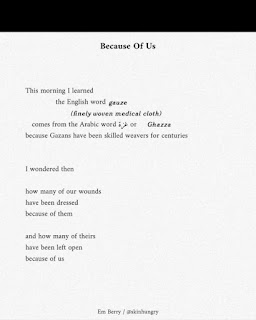Lara Marlowe’s opinion piece in The Irish Times yesterday throws some light on the current conflict in the Middle East.
In the photograph taken on the White House lawn, Yitzhak Rabin and Yasser Arafat shake hands while Bill Clinton hovers over, beaming like a proud schoolmaster.
A time-lapsed photo might have shown two shadowy, invisible actors waiting in the wings: Yigal Amir, the fundamentalist Jewish Israeli who would assassinate Rabin in 1995, and Hamas, the Muslim fundamentalist group that would supplant Arafat’s Fatah as Israel’s enemy number one.
Extreme right-wing members of the settler movement now sit in prime minister Binyamin Netanyahu’s cabinet, where they advocate the ethnic cleansing of Palestinians and the annexation of the West Bank. Hamas slaughtered 1,200 Israelis and took another 240 Israelis hostage on October 7th. Israel’s furious response has killed more than 14,000 Palestinians in what Antonio Guterres recently called “a killing of civilians that is unparalleled and unprecedented” in his time as UN secretary general.
How did it get this bad? Gross diplomatic negligence by the US and, to an extent, Europe accounts for much of the downward spiral. Washington and Brussels allowed Netanyahu, who has served as prime minister for 16 of the past 27 years, to sabotage the two-state solution by multiplying exponentially the number of settlers in the West Bank, to 700,000 today.
Israeli pronouncements based on extreme language in Hamas’s 1988 charter portray it as hell bent on the annihilation of Israel. The truth is more nuanced. Hamas repeatedly offered to accept a Palestinian state in the West Bank and Gaza Strip, which implied tacit recognition of an Israeli state in between.
Successive Hamas leaders proposed a long-term hudna, an Islamic term for a ceasefire, with Israel, in exchange for a state in the territories seized by Israel in the 1967 war. “The hudna has been a part of Hamas’s thinking since the movement’s founding,” researcher Dag Tuastad wrote in a 2010 research paper for the Peace Research Institute Oslo.
Tuastad documented Hamas offers of a long-term ceasefire in 1988, 1997, 1999 and 2008. All asked for evacuation of the settlements, which are illegal under international law, release of Palestinian prisoners transferred to Israel in violation of the 4th Geneva Convention, and withdrawal to the 1967 borders.
Hamas officials offered to commit to anywhere from a decade to 30 years of peace. Some demanded that the right of return, enshrined in UN General Assembly resolution 194, be addressed immediately. Others said it could wait until peace took hold. All these initiatives were rejected or ignored by Israel and the US.
Hamas were not, of course, innocent peaceniks. They dispatched suicide bombers to Israeli cities and fired countless mortars and rockets at Israeli towns. Israel assassinated two Hamas leaders, Sheikh Ahmed Yassin and Abdel Aziz al-Rantisi, in 2004, shortly after each had proposed a long-term ceasefire.
The US and EU parroted Israel’s demand that Hamas recognise Israel and renounce violence. When did Israel recognise Palestine or renounce violence?
Hamas has always refused to recognise Israel, though Henry Siegman, a former director of the American Jewish Congress, wrote in the New York Review of Books in 2006 that he had been assured by high-ranking Hamas leaders that the militants might be willing to recognise Israel if Israel recognised Palestinian rights.
On May 1st, 2017, Meshaal held a press conference at the Sheraton Hotel in Doha to formally announce that Hamas would accept a Palestinian state in the West Bank and Gaza Strip. He also distinguished between anti-Zionism and anti-Semitism, saying that Hamas’s conflict “is with the Zionist project, not with the Jews because of their religion”.
Again, Hamas’s proposal, which was in line with international law and UN resolutions, was rejected out of hand by Israel and the US. Later that year Donald Trump moved the US embassy to Jerusalem.
Such missed opportunities go a long way to explaining how the war between Hamas and Israel escalated from children throwing stones at Israeli soldiers in the 1987 intifada to the wholesale slaughter of the past seven weeks. Contrary to what Netanyahu says, Hamas is not Isis. The latter is a fanatical, apocalyptic group who dream of a worldwide caliphate. Hamas is an Islamist nationalist group that wants a Palestinian homeland in the West Bank and Gaza Strip.
Ben Hubbard of the New York Times travelled to Beirut and Doha to ask exiled Hamas officials why the group committed the atrocities of October 7th. Such interviews would have been unthinkable with Isis, which kidnapped and beheaded western journalists.
Hamas officials told Hubbard they were angered that attacks on Palestinians in the West Bank, where more than 400 Palestinians have been killed by Israeli fire this year, went unnoticed and unpunished. Israeli police raided the Al Aqsa mosque, one of the holiest sites in Islam. And Gaza has endured a 16-year blockade imposed by Israel. They saw Arab countries abandoning the Palestinians to normalise relations with Israel. Palestine was seeping away, and the world was indifferent. Hamas felt they had to do something extreme to blow up the status quo.








